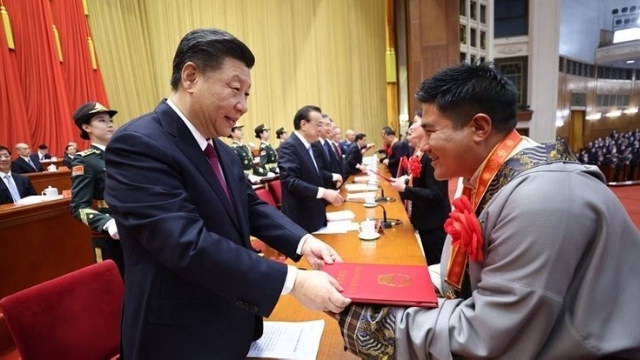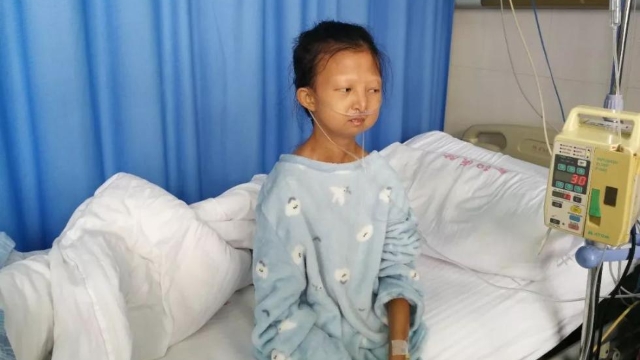The ChiCom regime is built on lies. This is no different. The CCP must be destroyed! #SmashTheCCP #BoycottChineseGoods #Boycott2022WinterOlympics,
From Bitter Winter
By Massimo Introvigne
Triumphal ceremonies hailed Xi Jinping’s victory in the “war on poverty.” But data are either false or misinterpreted.

Last Thursday, President Xi Jinping was hailed in a public ceremony for having achieved what he had promised: eradicating poverty in China by the end of the year 2020. And the CCP’s People’s Daily celebrated Xi’s “historical victory” with one of its longest articles in recent years. It is a nice story. Even some Western media seemed to believe it. Only, it is not true.
First, what is true is that there is less poverty in China today than in the 20th century, when the country suffered for decades the consequences of Chairman Mao’s Great Leap Forward (1958–1962), widely regarded as the greatest human-made disaster in history, with estimates ranging from 15 to 55 millions of Chinese who died of starvation. While we should not forget that it was the CCP that created the disaster, nobody denies that the situation is incomparably better now. The lie, in celebrative articles such as the one published last week by the People’s Daily, is in the argument that China achieved some results due to the CCP approach, which privileges the fight on poverty over the Western concept of democracy. Even if we accept Chinese official statistics (on which more below) at face value, India’s results are comparable to China, and India, with all its problems, is a democracy. Tanzania, which did better than China, is regarded by some as only partially democratic, but certainly has more democracy than China, and did not rely on Xi Jinping’s thought to achieve its results in the fight against poverty.

Second, when a country tells us that it has defeated poverty, we should look at its definition of poverty. Xi Jinping is a master in the Orwellian art to redefine the meaning of words to suit his propaganda. He seems to have been successful in persuading many in the world that “poverty” is an absolute concept. Xi has arbitrarily fixed the poverty line at an income of $ 2.30 or Euro 1.89 per day. He claims that this is above the World Bank threshold of $ 1.90.
Those who discuss these numbers with Xi Jinping have already fallen in his trap. Social scientists know that what counts is not so much absolute poverty but relative poverty. Can somebody survive with $ 2.30 per day? To this question, there are no absolute answers valid everywhere. You can perhaps survive in Tanzania, but not in New York, or London—and certainly not in Beijing, Shanghai, Shenzhen, or Guangzhou, which are all listed among the 20 most expensive cities in the world.
Absolute figures for poverty are used when dealing with extremely poor third-world countries. China is among the first economies in the world, as Xi Jinping proudly reminds us every week. One can say that the extreme poverty threshold for developed economies recommended by the World Bank is $ 5.50, i.e., roughly the double of the $ 2.30 used by the CCP, but this is not the best way of calculating. Relative poverty is defined by looking at the median income, and counting as poor those whose income is less than 50% of the median. Academics often use this standard to measure poverty in the U.S. or the European Union. While the poor are now 0% if we define them by Xi’s absolute poverty threshold of $ 2.30 per day, by using relative poverty calculations the poor in China are around 20% of the population. For such an advanced economy as China, the standard that makes sense to use is relative poverty.
Third, all these calculations are based on the official Chinese statistics. The problem is that these statistics are often falsified by local bureaucrats, who should meet the targets of the five-year and other CCP plans, or else. Who says that statistics on poverty are not reliable? Bitter Winter? The U.S. Department of State? The correct answer is, Xi Jinping. In 2020, Xi warned against “fake” or “statistics-oriented” data on poverty reduction. Scholars of corruption in China found more than 200,000 cases in three years (2016, 2017, and 2018) of local bureaucrats investigated for tampering with poverty data. Although many did it to classify their friends as poor, so that they could receive subsidies, the prevalence of corruption indicates that data collection on poverty in general is not reliable. There is also the suspect that some received subsidies in 2020 to be counted among those who overcame the $ 2.30 per day threshold in that year, and allow the CCP statistics to proclaim victory over poverty—with no guarantees that they will not fall again under that threshold once the celebrations are concluded.

We often hear from the world’s moral leaders such as Pope Francis that the rich are becoming even more rich, and the poor are becoming more poor. We hear less often that this is precisely the case in China, one of the countries where inequality rises more speedily and spectacularly. Bitter Winter told in 2020 the story of Wu Huayan, a student who had to survive (and care for her mentally ill brother) with an income of $ 43.50 per month. She was poor even under Xi Jinping’s standards ($ 2.30 per day are $ 46 per month), and ended up dying of starvation in 2020, the glorious year of the eradication of poverty.
Yes, there have been improvements with respect to poverty in China. But the concept of “eradication of poverty” is largely propaganda, and among the immigrants to the largest cities from the countryside, the impoverished students, and those who are part of ethnic minorities or are regarded as hostile to the CCP, there are still many Wu Huayans.
No comments:
Post a Comment
Comments are subject to deletion if they are not germane. I have no problem with a bit of colourful language, but blasphemy or depraved profanity will not be allowed. Attacks on the Catholic Faith will not be tolerated. Comments will be deleted that are republican (Yanks! Note the lower case 'r'!), attacks on the legitimacy of Pope Leo XIV as the Vicar of Christ, the legitimacy of the House of Windsor or of the claims of the Elder Line of the House of France, or attacks on the legitimacy of any of the currently ruling Houses of Europe.